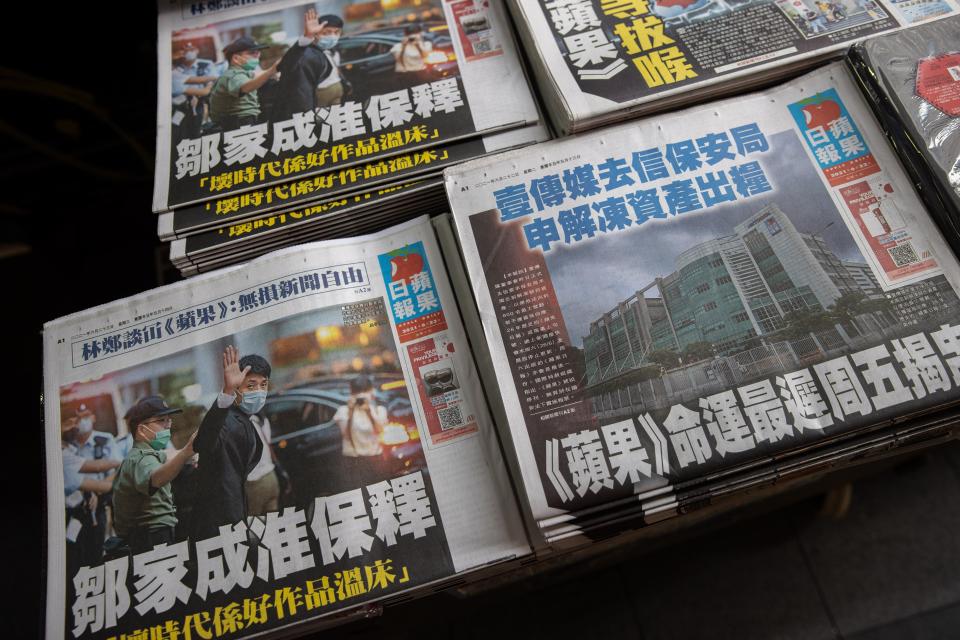Apple Daily: Hong Kong’s pro-democracy newspaper says last edition will be Thursday due to safety concerns

In a major blow to press freedom, Apple Daily, Hong Kong’s largest and last pro-democracy newspaper, says it will print its final edition on Thursday after a series of arrests and an asset freeze, according to a statement from the media house.
The paper’s management said that “in view of staff members’ safety”, it had decided “to cease operation immediately after midnight” – making Thursday’s publication the final printed edition.
“Thank you to all readers, subscribers, and clients and Hong Kongers for 26 years of immense love and support. Here we say goodbye, take care of yourselves,” Apple Daily said in an online article.
The newspaper had come under fire from authorities over its coverage, with charges slapped on editors and the owners of the company. The newsroom has been raided and its assets frozen under a controversial national security law imposed last year.
On Wednesday, Hong Kong police also arrested a columnist of the newspaper on “suspicion of conspiring to collude with a foreign country or foreign forces,” the CNA news channel quoted Hong Kong broadcaster TVB as saying.
The name of the 55-year-old man was not revealed by the police. However, TVB identified that the columnist used to be published in the paper under the pen name of Li Ping.
TVB also said, quoting a senior executive at Next Digital – which publishes Apple Daily – that along with the columnist, a reporter was also arrested. However, no details about their identity or charges were shared.
Reacting to the news of Apple Daily’s closure on Wednesday, the UK’s foreign secretary Dominic Raab labelled it “a chilling blow to freedom of expression in Hong Kong”.
“It is crystal clear that the powers under the national security law are being used as a tool to curtail freedoms and punish dissent, rather than keep public order,” he wrote in a statement.
“The Chinese government undertook to protect press freedom and freedom of speech in Hong Kong under the UK-Sino Joint Declaration. It must keep its promises, and stand by the commitments it freely assumed,” he further said.
The closure comes after a series of arrests of editors and executives of the paper, as the company’s assets were also frozen as part of the ongoing crackdown.
Around 500 police officers raided the Apple Daily’s newsroom on Thursday last week and arrested five people, including chief editor Ryan Law and chief executive Cheung Kim-hung, who have been charged under the national security law for an alleged “collusion with a foreign country” and their bails were denied on Saturday.
Rights groups, including the UN spokesperson for human rights, media organisations and several countries have criticised these raids, raising alarm over fears of media freedom in one of the most prominent financial capitals of the world where multiple international media organisations have their bureaus.
The police have made around 30 articles published by the newspaper as the basis of these charges under the controversial national security law. After a year of unrest in the former British colony, this is the first time editorial coverage has been used to frame charges against a media organisation.
Beijing firmly opposed Washington’s meddling in the internal affairs of the nation and Hong Kong, foreign ministry spokesman Zhao Lijian said.
Hong Kong leader Carrie Lam, responding to US condemnation of the raid on the company’s offices last week, said it is attempting to “beautify acts” that undermine national security.
“Don’t try to underplay the significance of breaching the national security law, and don’t try to beautify these acts of endangering national security, which the foreign governments have taken so, so much to their heart,” she said at her weekly press conference.
Several media organisations reported that an Apple Daily reporter present in the conference was not given a chance to ask questions. However, at the end of the session, he shouted: “You said the national security law only affected a small number of people. But more than 800 people from my company were forced to lose our jobs. Can you respond, Mrs Lam?”
Before the expected decision of the end of the popular 26-year-old tabloid was announced, the company declared on Sunday that the freezing of its assets had left it with cash for “a few weeks” for normal operations.
Chinese media has also intensified its attacks against billionaire founder Jimmy Lai after the raids. Several state-controlled newspapers published illustrations portraying him as a “dog-like animal” and a shoe-shiner doing the bidding of the United States.
A 24-page pull-out section published by the Wen Wei Po newspaper on Wednesday features a picture of Mr Lai on the front page with the headline: “Crime – Record of Awful Behaviour of China Traitor Lai at Poisonous Apple.”
Mr Lai is in jail on charges of illegal assembly stemming from pro-democracy protests last year.
The company has also been battered by a series of resignations following the freezing of funds, as its strength was reduced to almost half during a year-long tussle with the authorities. According to the South China Morning Post, only about 20 employees have been left in the print section of the company, who vowed to stay working till the last edition of the paper goes out on 24 June.
Read More
Final print edition of Hong Kong’s pro-democracy Apple Daily newspaper sells out

 Yahoo Finance
Yahoo Finance 